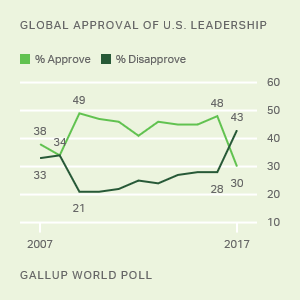
A Conversation With Ian Bremmer
President and Founder of Eurasia Group
You've written a lot about the geopolitical risks facing the world in 2019 and beyond. How do the findings in this ���۴�ýreport -- "" -- fit into your assessment? What do they tell you?
Bremmer: They tell me that with approval of American leadership at a near-record low and disapproval at record highs, the Pax Americana era of world history is coming to a close -- and while the U.S. foreign policy establishment may not know it, the rest of the world certainly does.
Relatedly, the end of Pax Americana has plenty to do with the continued deterioration of the Transatlantic alliance, a relationship that was the backbone of that American world order for the last roughly seven decades. Even during the Obama years, median approval of U.S. leadership never topped 50% in Europe. This has been a slow unwind, one accelerated by Trump sitting in the Oval Office. But make no mistake -- the unwind was coming, regardless of who won the 2016 election. It's just now been sped up.
Also, I was struck (though not particularly surprised) to see that Asia has largely the same (low) levels of approval of German, Chinese, U.S. and Russian leadership -- a stark reminder that Asia remains the world's great geopolitical hotspot in 2019, with no shortage of risks coming at it from all different directions (though admittedly less from Germany, if we're being honest).
Any surprises for you in this report? If no, why not? And if yes, can you talk a little about a few of them and why they surprised you?
Bremmer: I was surprised to see that Russia's median approval rose from 22% in 2014 to 30% in 2018. Yes, 2014 was a particular low point for Russia, given its annexation of Crimea, but I would have expected a sustained assault on liberal democracies ever since using information warfare would have had more of an impact, not leave it basically tied with U.S. leadership.
Furthermore, I was surprised to see that Russia is still the least likely to approve of U.S. leadership among Europeans at 11%, especially given the genuine fondness evinced by Trump toward Putin. True, this is an uptick from the 2% the U.S. had in the final year under Obama, but for a U.S. president to be so openly fond of Putin, I would have expected a somewhat better showing.
Finally, I was surprised to see that there was not much of a drop-off in Africa's approval rating of U.S. leadership between the last year of Obama and the first years of Trump, bucking the global trend. It seems that the occupant of the Oval Office really matters everywhere else to perceptions of U.S. global leadership … except in Africa.
Should leaders care what the world thinks of them? How much does soft power matter? And does it matter more or less than it has in the past?
Bremmer: Should they? Probably. It makes their lives easier on the international stage if their countries are well-liked, and leaders play an important part in their country's likability. But the political realities of the 21st century mean that soft power really only matters at the margins anymore. For example -- are countries signing up for Belt and Road because they like the Chinese or because they need the money Beijing is offering for infrastructure upgrades? Obviously the latter.
Soft power matters a heck of a lot less than it used to -- when Hollywood was the only one making movies, that made a big difference in the perceptions people had of the U.S. But in today's fracturing media/tech environment, people have so many options that it's impossible to imagine any one country/industry having the sway that they once did.
If you had to advise the leaders of the U.S., Germany, Russia or China on these data, what would you tell them?
Bremmer: To U.S. leadership, I'd say that transactional international relationships, while yielding very real benefits in the short run, have major costs over the long run. To Germany's leadership, I'd say that having high approval ratings worldwide is great and all, but you should be much more concerned about your perceived leadership within EU member states. To Russia's leadership, I'd say that being a power broker on the world stage may make you feel like you're calling the shots, but you need to be much more concerned about your domestic situation, which is rapidly deteriorating. And to China, I'd say that economically speaking, you're well on your way; keep an eye on global sentiment toward your leaders, as it will make your lives incalculably easier if they're well-liked.
Bremmer is the president and founder of Eurasia Group, the leading global political risk research and consulting firm. He is also the president and founder of GZERO Media, a Eurasia Group company dedicated to helping a broad, global audience make sense of today's leaderless world.
Find out more about how the world views the U.S. and major global powers in Gallup's report.
The views of those interviewed are expressly their own.



